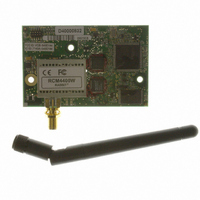20-101-1221 Rabbit Semiconductor, 20-101-1221 Datasheet - Page 51

20-101-1221
Manufacturer Part Number
20-101-1221
Description
RCM4400W (JAPAN TELEC CERTIFIED)
Manufacturer
Rabbit Semiconductor
Series
RabbitCore®r
Datasheet
1.20-101-1202.pdf
(126 pages)
Specifications of 20-101-1221
Frequency
2.4GHz
Modulation Or Protocol
802.11 b
Power - Output
16dBm
Voltage - Supply
3.3V
Current - Receiving
450mA
Current - Transmitting
450mA
Data Interface
Connector, 2 x 25 Header
Memory Size
512K Flash, 1MB SRAM
Antenna Connector
SMA
Operating Temperature
-20°C ~ 85°C
Package / Case
Module
Lead Free Status / RoHS Status
Lead free / RoHS Compliant
Applications
-
Sensitivity
-
Data Rate - Maximum
-
Other names
316-1147
5.1 More About Dynamic C
Dynamic C has been in use worldwide since 1989. It is specially designed for program-
ming embedded systems, and features quick compile and interactive debugging. A com-
plete reference guide to Dynamic C is contained in the Dynamic C User’s Manual.
You have a choice of doing your software development in the flash memory or in the static
SRAM included on the RCM4400W. The flash memory and SRAM options are selected
with the
The advantage of working in RAM is to save wear on the flash memory, which is limited
to about 100,000 write cycles. The disadvantage is that the code and data might not both
fit in RAM.
Developing software with Dynamic C is simple. Users can write, compile, and test C and
assembly code without leaving the Dynamic C development environment. Debugging
occurs while the application runs on the target. Alternatively, users can compile a program
to an image file for later loading. Dynamic C runs on PCs under Windows NT and later—
see Rabbit’s Technical Note TN257, Running Dynamic C
additional information if you are using a Dynamic C under Windows Vista. Programs can
be downloaded at baud rates of up to 460,800 bps after the program compiles.
OEM User’s Manual
Dynamic C is an integrated development system for writing
embedded software. It runs on an IBM-compatible PC and is
designed for use with single-board computers and other devices
based on the Rabbit microprocessor. Chapter 5 describes the
libraries and function calls related to the RCM4400W.
NOTE: An application can be compiled directly to the battery-backed data SRAM on the
NOTE: Do not depend on the flash memory sector size or type in your program logic.
Options > Program Options > Compiler
RCM4400W module, but should be run from the fast SRAM after the serial program-
ming cable is disconnected. Your final code must always be stored in flash memory for
reliable operation. RCM4400W modules have a fast program execution SRAM that is not
battery-backed. Select
Options > Project Options > Compiler
the fast program execution SRAM at run-time to take advantage of the faster clock
speed. This option optimizes the performance of RCM4400W modules running at
58.98 MHz.
The RCM4400W and Dynamic C were designed to accommodate flash devices with
various sector sizes in response to the volatility of the flash-memory market.
Code and BIOS in Flash, Run in RAM
5. S
OFTWARE
menu to store the code in flash and copy it to
menu.
®
With Windows Vista
R
EFERENCE
from the Dynamic C
®
, for
45

















